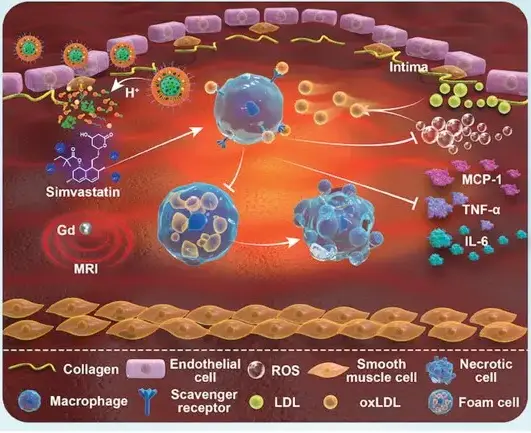NUS Medicine Researchers Develop Breakthrough Nanoparticle Technology for Targeted Diagnosis and Treatment of Atherosclerosis
Published: 18 Sep 2024

The mechanism of pH-responsive and MRI-functional ST/NCP-PEG nanomedicine enabling spontaneous diagnosis and treatment of atherosclerosis.
Atherosclerosis is the build-up of plaque in the arteries which causes their narrowing. It is a primary cause of ischemic heart disease (IHD) and ischemic stroke (IS), both of which are major contributors to the 17.9 million deaths caused by cardiovascular diseases each year globally.
Commonly used methods for imaging atherosclerotic plaques include techniques like intravascular ultrasound, coronary angiography, computed tomography angiography and magnetic resonance imaging (MRI). However, these methods have limitations in resolution, invasiveness, and most importantly, the ability to deliver targeted therapies. There are also currently no medications or treatments that can specifically target atherosclerotic plaques, to significantly reduce plaque burden or reverse atherosclerosis.
A team at NUS Yong Loo Lin School of Medicine (NUS Medicine) has developed a groundbreaking nanoparticle technology that can diagnose atherosclerosis, target atherosclerotic plaques, and deliver therapeutic agents directly to inhibit the progression of atherosclerosis in the preclinical models. Composed of nanoscale coordination polymers (NCP) and a pH-responsive linker, the nanoparticles work by breaking down specifically in the acidic environment of atherosclerotic plaques, releasing gadolinium — a contrast agent for MRI — for real-time imaging of plaque severity while simultaneously delivering Simvastatin, a water-insoluble drug with anti-inflammatory properties and anti-ROS (reactive oxygen species) properties that contribute to plaque stabilisation and treatment, reducing the risk of cardiovascular events.
This innovative theranostic approach, published in the journal Small, represents a significant advancement in the field of cardiovascular medicine as it offers a promising alternative to current medical practices for the management of atherosclerosis.
Led by Assistant Professor Wang Jiong-Wei from the Department of Surgery, Nanomedicine Translational Research Program at NUS Medicine, and Cardiovascular Research Institute (CVRI), this multidisciplinary study was conducted in collaboration with Associate Professor James Kah from the Department of Biomedical Engineering and Professor Liu Bin from the Department of Chemical and Biomolecular Engineering under the College of Design and Engineering at NUS, and Prof Liu Xiaogang from the Department of Chemistry at the NUS Faculty of Science.
Read more in the press release here.

